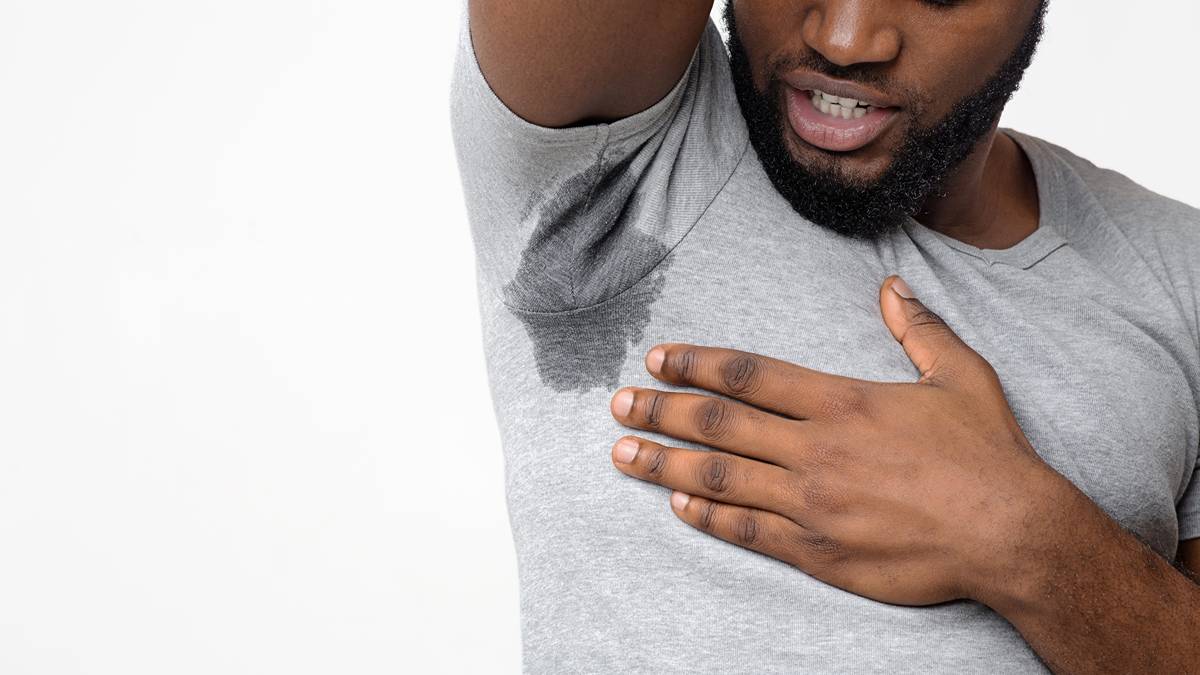Health Check: No sweat as Botanix boosts quarterly revenue and reduces cash burn

About ten million Americans are afflicted by excessive underarm sweating. Luckily Botanix has a better answer than lashings of Brut-33. Pic: Getty Images
- Botanix shares leap 17% on a solid start to the US rollout of the company’s anti-sweating treatment, Sofdra
- Radiopharm raises up to $40 million, while Orthocell banks $30 million
- Avita faces tough questions after surprise CEO departure
Botanix Pharmaceuticals (ASX:BOT) is gaining traction with US sales of its treatment for excessive underarm sweating (primary axillary hyperhidrosis).
The US Food and Drug Administration (FDA) approved the topical treatment, Sofdra, in June last year. Botanix launched the drug in February this year.
Botanix today reports September quarter net revenue of $7.1 million, compared with $4.3 million in the June quarter.
Shipped prescriptions rose to 20,418, from 13,647 previously.
Gross revenue of $30.2 million compared with $20.4 million in the previous quarter.
Botanix shares lost around half their value in early July after the company revealed a greater-than-expected difference between the gross and net takings.
In other words, ticket clippers such as insurers and managed care organisations have demanded higher rebates and discounts than expected.
But the company’s ‘gross to net’ (GTN) ratio crept up to 23% from 21% in the June quarter.
Management aims for a GTN of 30-40%, which is more typical of a dermatological drug.
Meanwhile, Botanix’s operating cash outflows reduced to $13.1 million from $28.4 million previously. The company has $49 million of cash.
Affecting ten million Americans, primary axillary hyperhidrosis is the third biggest dermatological disorder.
Pretty RAD raising
Having raised a beefy $70 million in June last year, Radiopharm Theranostics (ASX:RAD) has returned to the well with a $35 million placement and a share purchase plan (SPP) for a further $5 million.
Both components are being done at three cents a share, a 19% discount to the last traded price on October 15.
Subscribers also get one-for-one options, exercisable at 3.9 cents by October 2027.
Strategic holder Lantheus has chipped in $7.6 million of the placement, taking its Radiopharm holding to 14.5%.
The funds will support Radiopharm’s suite of radio imaging and diagnostic programs, covering brain metastases, Her-2 and PD-L1 positive solid tumours and pancreatic cancer.
The most advanced, the brain met program is in phase IIb stage.
The company today said the trial had dosed 12 of the 30 intended patients. It expects enrolment to complete in the March quarter.
Radiopharm’s effort highlights a growing appetite for biotech raisings – at least for ventures that investors deem as funds-worthy.
On Friday, nerve regeneration house Orthocell (ASX:OCC) said it had raised $30 million in a placement, to support the rollout of its approved Remplir product in the US.
The company did the deed at $1.30 a share, a 9% discount.
Speaking of Orthocell …
Orthocell today said it would invest $1 million for first right of refusal to distribute a novel bone-substitute product.
The treatment, Pearlbone, is sourced from sustainably obtained pearl shells on the Kimberley coast of WA.
Orthocell’s investment is by way of a memorandum of understanding to increase Orthocell’s stake in the private Marine Biomedics, from 1.7% to 12%.
Pearlbone has promising potential applications for bone regeneration and repair in the orthopaedic, trauma and reconstructive surgery markets.
Marine Biomedics is undertaking a “well advanced” pivotal trial of Pearlbone, in view of an FDA marketing application in the March 2026 quarter.
Avita CEO departs amid underlying problems
Analysts warn that Avita Medical (ASX:AVH) needs to cut costs amid last Friday’s sudden resignation of CEO Jim Corbett and an “exceptionally poor” revenue update.
Based in the US, Corbett had led the burns and wound repair company since September 2022.
Pending an executive search, chairman Cary Vance will fill the position.
Avita expects to report September quarter revenue of $US17 million ($26 million), 8% lower than the June quarter. The number is shy of consensus market expectations of US$20 million.
Bell Potter notes that with year-to-date revenue at US$54 million compared with current full year (calendar 2025) guidance of US$76 million, the board “inevitably will narrow expectations.”
After the company’s “exceptionally poor” update, the firm expects Avita to undergo a major cost cutting program.
“Avita cannot continue to support the current cost base in the absence of sales growth and its ongoing [circa] $US10 million a quarter cash burn.”
Over the last three years the company has required ongoing recapitalisation, “which is now unsustainable”.
Covenant relief
Avita has a US$90 million facility with the New York-based healthcare investor Orbimed, taken out in 2023.
Orbimed again has waived a revenue covenant, relating to trailing 12-month net revenue for the September quarter. The parties are discussing “redefining future covenants.”
According to broker Canaccord, Avita’s revenue was affected by payors reacting slowly to changed “reimbursement mechanics”.
Investors will know more when Avita releases its quarterly results on November 6.
“But knowing how long these processes can take, it seems likely that this dislocation in provider payment has continued,” Canaccord says.
The firm also is unconvinced by management’s decision to cut and redeploy its field sales team. This includes the service component, which surgeons valued.
Canaccord says there’s much to like about Avita’s Recell spray-on-skin products.
“Before re-engaging with the stock, we would need to see sufficient capital raised to repay the debt, reboot the sales/service models and refocus on prospective evidence development.”
Bell Potter says the company continues to sell around 1000 Recell kits per month at a decent margin.
But “the current management has been unable to leverage this base and has misread the market”.
Avita shares fell 26 cents or 16% on Friday’s news and this morning were a further 8% or so off the pace.
Well strike me, Clinuvel’s ‘rem’ vote fails
Clinuvel Pharmaceuticals (ASX:CUV) has become the first ASX biotech to incur a ‘first strike’ against its remuneration report in this year’s round of annual general meetings – and by a wide margin.
Voting shareholders knocked down the item with just under 63% casting against the motion. Companies incur a ‘strike’ if more than 25% of voting holders are opposed to the item.
While the remuneration motion itself is not binding, a second ‘strike’ next year would bring on an automatic vote to spill the board. However, such ‘spill’ votes rarely succeed.
At Friday’s AGM, holders were more than happy to re-elect directors Prof Jeffrey Rosenfeld and Matthew Pringle to the board.
Clinuvel shares fell 43 cents – just under 4% – on Friday, but this morning had recovered half the losses.
Related Topics

UNLOCK INSIGHTS
Discover the untold stories of emerging ASX stocks.
Daily news and expert analysis, it's free to subscribe.
By proceeding, you confirm you understand that we handle personal information in accordance with our Privacy Policy.








